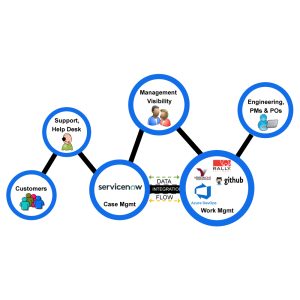Artificial intelligence (AI) has become integral to modern business operations, driving efficiencies and unlocking new opportunities across various industries. However, as AI systems increasingly influence critical decisions, concerns about their trustworthiness have come to the forefront. Issues such as data bias, lack of transparency, and compliance with regulatory standards pose significant challenges. Building AI models that stakeholders can trust requires a concerted effort to ensure transparency, fairness, and accountability throughout the AI lifecycle.
IBM addresses these challenges with robust tools like Watson Studio and Watson Knowledge Catalog. Watson Studio provides a collaborative environment for data scientists and developers to build, train, and manage AI models efficiently. Complementing this, Watson Knowledge Catalog offers intelligent data cataloging and governance capabilities, ensuring that data used in AI models is well-organized, secure, and compliant with policies. Together, these tools empower organizations to develop AI solutions that are not only powerful but also trustworthy and aligned with ethical and regulatory standards.
Understanding Trustworthy AI
Trustworthy AI encompasses several key principles that ensure artificial intelligence systems are developed and deployed responsibly:
- Transparency: AI systems should provide clear insights into their decision-making processes, enabling stakeholders to understand how outcomes are derived. This openness fosters trust and allows for informed oversight.
- Fairness: It’s essential to design AI models that treat all users equitably, avoiding biases that could lead to discriminatory outcomes. Ensuring fairness promotes inclusivity and social justice.
- Accountability: Organizations must take responsibility for their AI systems’ actions, establishing mechanisms to audit and explain decisions. Accountability ensures that AI operates within ethical and legal boundaries.
- Compliance: AI applications must adhere to relevant laws, regulations, and ethical standards, safeguarding user rights and maintaining public trust. Compliance is critical for the sustainable integration of AI into society.
Building AI models that align with these principles requires a combination of the right tools, processes, and governance frameworks.
IBM Watson Studio: Empowering AI Development
Watson Studio is an integrated development environment (IDE) designed for data scientists, developers, and analysts to build, train, and manage AI models. It provides a collaborative platform that supports the entire AI lifecycle.
Key Features of Watson Studio
- Collaborative Environment: Watson Studio provides a unified workspace where data scientists, analysts, and developers can collaborate effectively. It supports shared projects, version control, and integrated tools like Jupyter Notebooks and RStudio, fostering seamless teamwork across diverse roles.
- AutoAI: This feature automates the machine learning lifecycle, including data preparation, model selection, feature engineering, and hyperparameter optimization. AutoAI accelerates model development, making it accessible to users with varying levels of expertise.
- Visual Modeling: Watson Studio offers drag-and-drop tools inspired by IBM SPSS Modeler, enabling users to build machine learning models without extensive coding. This visual approach simplifies complex workflows and enhances productivity.
- Integration with Open Source Tools: The platform supports popular open-source frameworks such as TensorFlow, PyTorch, and scikit-learn. This compatibility allows users to leverage existing skills and tools within a cohesive environment.
- Deployment Flexibility: Built on Red Hat OpenShift, Watson Studio enables flexible, scalable, and portable deployments across various environments, including on-premises, cloud, and hybrid setups. This flexibility ensures that models can be deployed where they are needed most.
By leveraging Watson Studio, organizations can streamline the development of AI models while ensuring consistency and efficiency.
IBM Watson Knowledge Catalog: Ensuring Data Governance
Watson Knowledge Catalog is a data cataloging and governance solution that helps organizations manage their data assets effectively. It plays a crucial role in building trustworthy AI by ensuring that data used in model development is well-governed and compliant.
Key Features of Watson Knowledge Catalog
- Data Cataloging: Organizes and classifies data assets into a centralized catalog, enabling users to easily discover and access data. This structured approach facilitates efficient data management and supports data-driven decision-making across the organization.
- Metadata Management: Maintains comprehensive metadata, including data lineage and auditing information, to provide context and traceability. This ensures that users understand the origins and transformations of data, enhancing trust and compliance.
- Data Quality Monitoring: Continuously assesses data quality through automated profiling and validation rules, ensuring data reliability. By identifying and addressing data issues proactively, it supports the development of accurate and trustworthy AI models.
- Access Control: Implements role-based access controls to protect sensitive information and ensure that only authorized users can access specific data assets. This security measure helps maintain data privacy and complies with regulatory requirements.
- Policy Enforcement: Applies data governance policies consistently across the organization to maintain compliance with regulations. Automated enforcement of these policies ensures that data handling practices align with legal and ethical standards.
Integrating Watson Knowledge Catalog into the AI development process ensures that data used is trustworthy, which is fundamental to building reliable AI models.
Building Trustworthy AI Models: A Step-by-Step Guide
Step 1: Data Discovery and Preparation
Begin by identifying and cataloging relevant data assets using Watson Knowledge Catalog. Assess data quality and lineage to ensure the data is suitable for model development.
Step 2: Collaborative Model Development
Utilize Watson Studio to bring together data scientists and analysts in a collaborative environment. Leverage AutoAI and visual modeling tools to develop initial models efficiently.
Step 3: Model Training and Evaluation
Train models using curated data, ensuring that training processes are transparent and reproducible. Evaluate models for accuracy, fairness, and bias, making adjustments as necessary.
Step 4: Deployment and Monitoring
Deploy models across desired environments using Watson Studio’s flexible deployment options. Implement monitoring to track model performance and detect any drift or anomalies over time.
Step 5: Governance and Compliance
Continuously govern data and models using Watson Knowledge Catalog. Ensure that access controls, data policies, and compliance requirements are enforced throughout the AI lifecycle.
Benefits of Using Watson Studio and Watson Knowledge Catalog
- Enhanced Trust: By integrating robust data governance and transparency features, these tools enable the development of AI models that stakeholders can trust. This fosters confidence in AI-driven decisions and promotes wider adoption across the organization.
- Regulatory Compliance: Watson Knowledge Catalog enforces data policies and access controls, ensuring adherence to data protection laws and ethical standards. This proactive compliance reduces the risk of regulatory penalties and enhances data security.
- Operational Efficiency: Watson Studio streamlines the AI development process through automation and collaboration tools, reducing time to deployment. This efficiency allows teams to focus on innovation rather than manual tasks.
- Scalability: The integrated platform supports scaling AI initiatives across the organization with consistent governance. This scalability ensures that AI solutions can grow with business needs without compromising on control or compliance.
- Collaboration: By providing a unified environment, these tools facilitate teamwork among data professionals, leading to more robust and accurate AI solutions. Enhanced collaboration accelerates project timelines and improves outcomes.
Building trustworthy AI models is essential for organizations aiming to leverage AI responsibly and effectively. By integrating Watson Studio and Watson Knowledge Catalog into their AI workflows, businesses can ensure that their models are transparent, fair, and compliant with regulatory standards. These tools provide a comprehensive framework for developing AI solutions that stakeholders can trust, ultimately driving better outcomes and fostering innovation.




